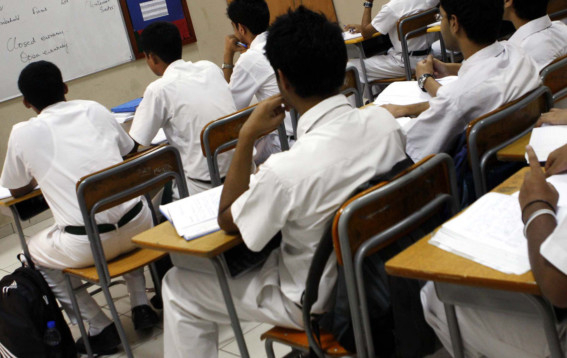
Abu Dhabi: UAE students fall way short of their global counterparts when it comes to maths and problem solving, according to an updated report of the Programme for International Assessment (PISA) released by the Organisation for Economic Co-operation and Development (OECD) on April 1.
The report, which compares 85,000 students from 44 countries, places UAE students in 39th place, their average score of 411 lagging behind the OECD mean score of 500. Students from Singapore, Korea and Japan emerged toppers with scores of 562, 561 and 552. Students from Canada, UK and US also ranked above average with scores of 526, 517 and 508.
FIFTH FROM THE BOTTOM
The countries that fared worse than the UAE, which was fifth from the bottom, included Montenegro, Uruguay, Bulgaria and Colombia.
The updated analysis, based on a study conducted in 2012, showed that UAE students fell below the average in not just overall performance but also in terms of the percentage of top performers and low performers. Only 2.5 per cent of UAE students emerged top performers compared to 29.3 per cent in Singapore. A shocking 54 per cent of UAE students were found to be low achievers, compared to just eight per cent in Singapore. The only area where they scored better than the OECD average was the “impact of social background”.
“Today’s 15-year-olds with poor problem-solving skills will become tomorrow’s adults struggling to find or keep a good job,” Andreas Schleicher, the OECD’s acting director of education and skills, was quoted as saying on the organisation’s website.
“Policymakers and educators should reshape their school systems and curricula to help students develop problem-solving skills which are increasingly needed in today’s economies.”
According to the report, around one in nine 15-year-olds in OECD countries can solve the most complex problems, compared to one in five among the top three. Only one in five students can solve the simplest problems, meaning they lack the skills the modern workplace needs, it was noted.
Gender gaps in problem-solving were found to be small, especially among low-performing students, with even the UAE scoring around the OECD average. On an average, the study found three top-performing boys for every two top-performing girls in problem solving in the OECD countries.
You Speak
Do you agree with the report?
Write to us at:
editor@xpress4me.com
sms 5101










